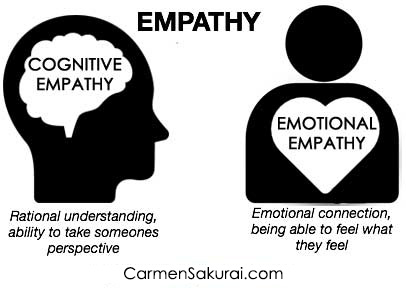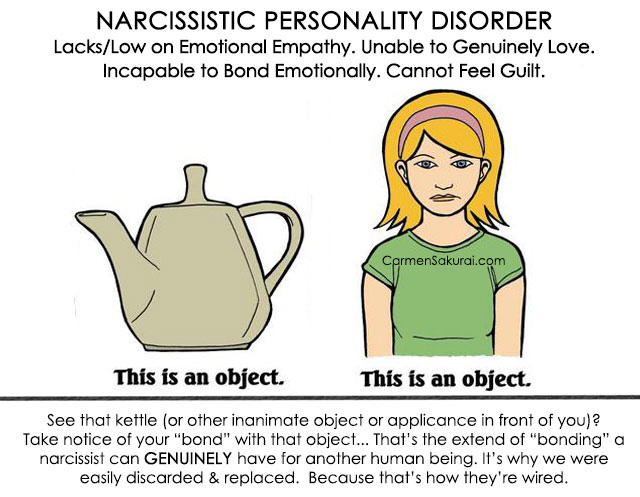Narcissistic Traits vs. Narcissistic Personality Disorder (NPD)
Many are confused between narcissistic "traits" and narcissistic personality disorder... as well as exactly what this disorder is about. Can love, patience, and understanding conquer all? Is this curable? So here's a clarification...
Narcissism:
Narcissism is a normal element of personality that exists on a spectrum in all individuals. And just like other personality traits (such as self-esteem and optimism), narcissism can range from healthy to pathological levels - from difficulty prioritizing the self (low)... to healthy self-focus & prioritization (balanced)... all the way to full blown narcissistic personality disorder (high) where they are unable to see past their own needs and view others only as an extension of themselves.
The term "narcissism" can be defined as the degree to which someone is self-focused, seeks recognition, and prioritizes their own needs or image.
Note: Narcissism does not equal Narcissistic Personality Disorder
Narcissistic TRAITS:
These are individual characteristics that fall under the spectrum of narcissism but don’t necessarily indicate a disorder. It can show up in ANYONE, especially in situations where confidence, ambition, or self-focus are needed. For example:
- Craving admiration or validation
- Feeling special or unique
- Being overly focused on appearance or achievements
- Having trouble accepting criticism
- Lacking empathy in certain moments
People with narcissistic traits might come off as self-centered or arrogant in some situations, but they don’t lack self-awareness, nor do these traits dominate their entire personality.
Note: Someone can be obsessed with their new haircut & makeup, post 50 selfies, and fish for compliments, and that’s just a narcissistic trait—not NPD!!!
Narcissistic Personality Disorder (NPD)
NPD is a clinical personality disorder that goes beyond traits - it’s a deep-rooted pattern that significantly affects relationships, work, and daily life. They include:
- Excessive need for admiration and validation
- Difficulty recognizing or caring for others' feelings
- Fragile self-esteem
- Inability to handle criticism
- Sense of entitlement
- Using others for personal gain

Meet Narcissus. A guy with extreme narcissistic TRAITS - not full-blown NPD
Their behavior is shaped by deep, unresolved shame, a fragile sense of self, and an overwhelming need for control. Without a stable, integrated identity, they rely heavily on external validation to fuel and maintain their sense of worth.
Someone with NPD doesn’t just have a big ego - they struggle to form genuine, reciprocal relationships because their sense of self is built on unstable foundations. Many people with NPD aren’t self-aware about their behaviors, and their patterns cause consistent damage in relationships.
Because of their intense internal shame, individuals with NPD often struggle to seek treatment. Acknowledging vulnerabilities can feel humiliating or even threatening to their self-image, making professional help difficult to accept. Their defense mechanisms—such as denial, projection, and blame-shifting—further prevent them from recognizing the need for change.
This is why NPD is often considered treatment-resistant.
A clinical diagnosis of a personality disorder can only be made by a qualified professional. However, recognizing harmful behavioral patterns doesn’t require expertise. Anyone can be negatively affected by allowing these individuals into their lives, which is why developing a strong sense of self and personal boundaries is the most effective form of self-protection.
Narcissists LACK “Emotional Empathy” - But They Can LEARN “Cognitive Empathy”

Emotional empathy
The stuff that gives a person the ability to bond and feel what another person's feeling. You understand and acknowledge that other people are their own independent, thinking and feeling beings - as such, you understand that someone else's emotions are valid even if you are not feeling the same thing.
Example: Your friend lost a loved one due to illness... she's devastated. Even if you're not experiencing the same grief, you are emotionally moved by the magnitude of her suffering. (Analogy: water on sponge - contrast to a narcissist’s lack of emotional empathy that makes them more like a rock instead of a sponge - completely unaffected by the emotions of others)
Cognitive empathy
Is the ability to logically (not emotionally) understand what another person is feeling. This means if you hurt another person, you know the person is hurt based only on information you have in your head.
Example: Your friend confides in you that she had been physically abused when she was a child. You hear the information given, offer a shallow, "I'm sorry you went through that"... then your mind wanders off to what you're having for lunch. (Analogy: water on waterproofed block of cement)
Making it difficult to identify this person as lacking empathy at first. It "seems" like this person can feel & relate... but they're merely observing and learning how to respond appropriately.
Narcissists See Others as an "Extension" of Themselves...
When you were a young child, it was normal to believe the world revolved around you, with little concern for the needs and desires of others. You also depended on your caregivers (parents, grandparents, etc.) for feedback to tell you if you were being "good" or "bad"—because you were still learning how to be your own person.
As you grew, you developed independence. You became your own, unique person with thoughts, emotions, and a solid sense of self. You also learned that other people are separate individuals with their own experiences, feelings, and perspectives.

People with NPD could not properly individuate
For narcissists, this process never fully happened. Their emotional development was disrupted—often due to genetics or childhood trauma (whether through neglect or excessive attention). As a result, their identity never became self-sustaining. Instead, they rely entirely on external validation ("supply") from people and things that exist only to revolve around them.
The source of external validation is called "source of supply" and to a narcissist, they aren't seen as separate, thinking individuals—but mere extensions of themselves.
Narcissists Have Incredibly Fragile Self-Esteem...

So fragile that even the smallest criticism can shatter it. To protect this, they've abandoned their "true (authentic) self" and created this perfectly amazingly fantasy identity they believe NO ONE should be able to find fault with. (Referred to as "false self").
This stems from extreme shame about their 'true self.' Since narcissists are unable to define themselves and rely entirely on external validation, they NEED you to constantly reassure them that their 'false self' is who they really are.
However, if you DO point out a fault (even if it's as small as disagreeing about something minor), they will go into narcissistic rage because admitting even the smallest mistake threatens the entire house of cards they’ve built around themselves.
They're thinking, "If they don't agree, they're saying I'm wrong... and if I'm wrong, that means I’m not as perfect as I need to believe I am... and if I’m not perfect, then I’m weak and worthless and unlovable”
A person with NPD is unable to see others as separate, thinking, and feeling individuals. Instead, they view people as mere extensions of themselves - existing only to serve a purpose. Because their brains are not wired for genuine care outside of themselves, the sole function of these 'extensions' (people, things, events, etc.) is to supply them with approval and applause to fuel their self-worth.

If you feel like you're reaching the end of your rope with nowhere to turn, call the 24-hr National Suicide Prevention Lifeline at 1.800.273.8255 or the 24-hr Crisis Text Line by texting “HELP” to 741-741. In an emergency, call 911 or go to your nearest emergency room.
Originally posted on my personal blog: Ninja Mom Diaries.
